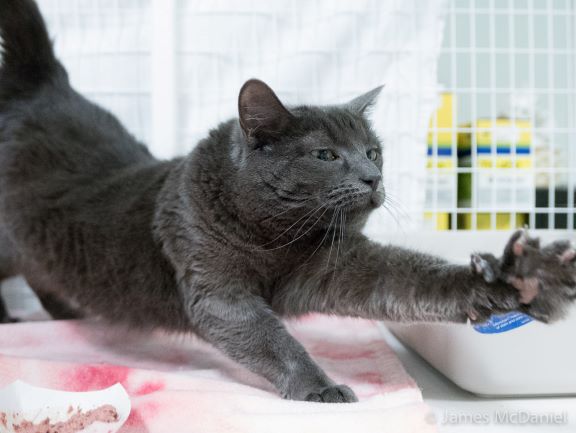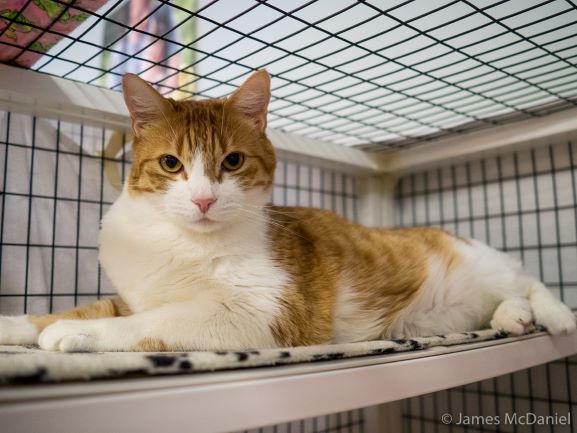
At MEOW, our adult cats have been evaluated by our Meet Your Match program.
Based on this evaluation, each cat is given one of nine distinct feline personality (“feline-ality”) assignments, helping us to pair adopters with cats best fitting their own personality and lifestyle.
Have you considered the differences between cats and kittens? Many available adult cats are barely out of kittenhood themselves. They still have plenty of spunk and energy–they’re just a bit more mature. That’s a good thing.

Here are 10 reasons why you may want to adopt an adult cat.
- What you see is what you get. Adult cats already know who they are. Kittens are undeniably cute, but you never know what the future holds, how large they may get, what their personality will ultimately be, etc. An adorable little kitten will be an adult in the blink of an eye.
- Adult cats aren’t as “chewsy.” Kittens have a tendancy to chew things, lots of things. Whether teething or just exploring bits of the world around them, kittens chew on shoes, the corners of books, ear lobes and fingers, carpet tassels, electrical cords, drapery strings, plants, and much, much more. Most adult cats don’t chew inappropriately at all.
- If you have an older cat in your home and are looking for a friend for him or her, another adult cat may be the best choice. Kittens can be too playful and may upset your cat instead of providing companionship. A kitten may cause your resident cat to be more annoyed than amused.
- After a long day at the office, you may just want to come home and curl up with your furry friend–but most kittens prefer an action packed evening–lots of touseling, frolicking, and plenty of running and jumping. An adult cat will greet you at the door and be more than happy to curl up and watch your favorite shows on TV. They’ve already learned about the unconditional love thing.
- Adult cats may sleep at the foot of your bed, under the bed or in a cozy spot somewhere else in the house, while a kitten will most likely run around all night, doing anything possible to wake you up for more games. Adult cats are generally happy to sleep when you do and don’t try to attack your toes through the blankets in the middle of the night.
- Adult cats won’t be climbing up your leg or your curtains, they won’t be swinging from your chandeliers, knocking down knick knacks or just running full speed ahead for no good reason.
- Adult cats are usually a better choice for families with small children. Kittens often play rough and are constantly underfoot. They’re sharp–they can’t help it, but kittens are all teeth and claws. Generally speaking, adult cats are more mellow, and often more patient with young children. The experience should be a good one for both the cat and the child. Ask to meet the shelter’s best “kid cats.”
- Adult cats require less attention and supervision. They’re quiet companions. They have well-developed manners, use the litter box and the scratching post without constant reminders.
- Many adult cats end up in shelters due to no fault of their own. Separated from their loved ones, surrounded by other cats, confined, confused, and sometimes frightened, many are emotionally devastated by their misfortune. Sadly, most people gravitate toward the cute, bouncy, big-eyed kittens. Older cats sit by and watch, as one loving family after another passes them over for a cute kitten. Adopting an adult cat is a way to say to a deserving animal “I believe in you.”
For the abandoned, forgotten, and heartbroken adult cats, you just might be their last chance to have the love and warmth of a home where they can live out their years in comfort. When properly cared for, cats often live well into their late teens or longer. Typically, they will remain active and even playful throughout most of their lives. Once a cat adjusts to a new home where they can feel safe and secure again, they’ll offer years of faithful companionship and unconditional love.

